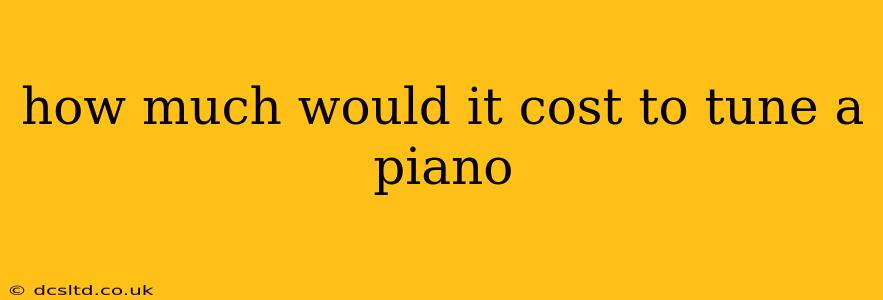How Much Does it Cost to Tune a Piano?
The cost of tuning a piano can vary significantly depending on several factors. While a quick online search might give you a range, understanding these factors will help you get a more accurate estimate and avoid unpleasant surprises. This guide will break down the price components and help you determine a reasonable cost for your piano tuning.
What Factors Influence Piano Tuning Costs?
Several key factors influence the final cost of a piano tuning:
-
Location: Piano tuners in major metropolitan areas tend to charge more than those in smaller towns or rural areas. The cost of living and travel time play a role.
-
Type of Piano: Tuning an upright piano is generally less expensive than tuning a grand piano, due to differences in accessibility and the complexity of the instrument.
-
Condition of the Piano: A piano that is severely out of tune or has significant mechanical issues might require more time and effort, resulting in a higher cost. A tuner may need to spend extra time addressing problems beyond a standard tuning.
-
Technician's Experience: Experienced, highly skilled piano tuners often command higher fees than those with less experience. Their expertise and reputation often justify the higher price.
-
Urgency of the Tuning: Requesting a same-day or next-day tuning will likely incur a higher fee due to the tuner's scheduling constraints.
-
Additional Services: Some tuners offer additional services like voicing (adjusting the tone of the piano), regulation (adjusting the action), or repairs, all of which will add to the overall cost.
How Much Can I Expect to Pay?
While precise pricing is impossible without knowing your specific circumstances, here's a general range:
-
Upright Piano: A typical tuning for an upright piano can range from $80 to $200.
-
Grand Piano: Tuning a grand piano usually costs more, typically ranging from $125 to $300 or even higher depending on the size and condition.
These are estimates. Always get a quote from a local tuner.
How Often Should I Tune My Piano?
This is a frequently asked question, and the answer isn't universally the same. Ideally, a piano should be tuned at least once a year, especially if it's regularly played. However, factors like climate, how often the instrument is used, and the piano's overall condition can influence tuning frequency. A piano in a very stable climate might only need tuning every 18 months, while one in a highly variable climate might need it more often.
What Questions Should I Ask a Potential Piano Tuner?
Before hiring a tuner, ask these questions to ensure you are comfortable with their services and pricing:
- What is your experience with [type of piano]?
- What is your hourly rate or the total cost for a tuning?
- What is included in the tuning (e.g., voicing, regulation)?
- Do you offer a guarantee on your work?
- What is your availability?
- Can you provide references?
Finding a Reputable Piano Tuner
Finding a qualified and reputable piano tuner is essential. Check online reviews, ask for recommendations from local music stores or teachers, and don't hesitate to ask questions before committing to a service. A well-tuned piano will significantly enhance your playing experience, so investing in professional tuning is worthwhile.
By understanding the factors influencing cost and doing your research, you can find a qualified piano tuner who offers a fair price and excellent service. Remember, a well-tuned piano enhances your playing experience and protects your investment.
